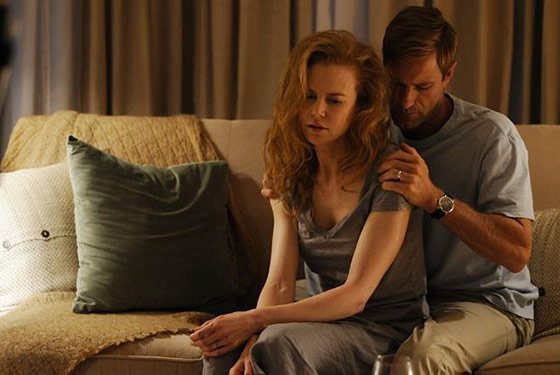
It doesnÔÇÖt take much for a work about a dead or dying child to rip you apart, which is why itÔÇÖs not unreasonable to demand an artist leave you with something more than shock and grief ÔÇö something like the title metaphor of David Lindsay-AbaireÔÇÖs play Rabbit Hole, which is meant to evoke both Lewis Carroll and Stephen Hawking. The title alludes to a damaged teenagerÔÇÖs self-penned comic book, which describes a universe of parallel time lines and multiple realities; and, on a narrative level, it resolves nothing. ItÔÇÖs the least banal solace imaginable.
John Cameron MitchellÔÇÖs film of Rabbit Hole (from a screenplay by Lindsay-Abaire) is very fine. Nicole Kidman and Aaron Eckhart play Becca and Howie Corbett, an affluent New York suburban couple still dazed, after eight months, from a tragic loss. The details of that event are revealed in tiny installments, a striptease that in other works (21 Grams, e.g.) can be noxious but here makes you watch whatÔÇÖs in front of you more closely. Broadly speaking, Howie is willfully, stubbornly stuck. Back from the office, he turns to old home videos the way junkies reach for the needle. He wants to stay in that enormous house and leave everything just as it was. But Becca, who left her job when she had a son and has little to do now, gropes her way toward the next stage of grief, aware that if she stays where she is, something in her will die.
Alas, I missed Rabbit Hole onstage with Cynthia Nixon and John Slattery, but did see Lindsay-AbaireÔÇÖs absurdist Fuddy Meers, which also centered on a wifeÔÇÖs bumpy journey to enlightenment and had an aspect of Alice in Wonderland. Fuddy Meers was satire with a vein of despair; Rabbit Hole is drama with a vein of satire. Becca comes from a working-class Long Island family with a history of drug abuse and dysfunction. Her job at SothebyÔÇÖs, her marriage, her move to an affluent suburb, her beautiful home with a beautiful son and a big dog: It has all melted into air. Yet her new world is incapable of acknowledging death.
As has been observed elsewhere, Kidman has apparently regained the use of her forehead  and the improvement is not just cosmetic. When actors get immobile, they sever (or, at very least, dull) the link between their features and emotions. In Australia, Kidman had the expressive range of The Wizard of Ozs Tin Woodsman; you could almost hear the actress inside her whimpering, Oil can   It mattered because there was an actress inside her  and because her entire career had been, until that point, a quest to overcome a certain Barbie Doll blankness. Such self-sabotage! The Kidman in Rabbit Hole is a revelation. She has chosen, shrewdly, to underline two things: Beccas righteous anger and the awareness that her anger isnt going to take her very far. At a painfully sensitive grief therapy meeting, she bridles and then snaps when a father asserts that what happened to his child was Gods will. She lashes out at her mother (Dianne Wiest), who lost a much older child under vastly different circumstances and tries to tell Becca that the tragedies were comparable. In Kidmans face you see a woman who has no idea what to do but knows she must do something. Thats when, by chance, she looks into a school bus at a stoplight and sees the teenager, Jason (Miles Teller), who changed her world forever.
What happens between Becca and Jason is too fragile to chart and there is, perhaps, a touch of wish fulfillment at work in Lindsay-AbaireÔÇÖs writing. But in his minefield of a role, Teller is wonderful ÔÇö first off-putting, then irrationally likable. His Jason is in shock and likely to remain so ÔÇö and also to remain half-formed, arrested at a stage in which heÔÇÖs likely never to find himself.
When playwrights ÔÇ£open outÔÇØ their plays for the screen, they often break up and pad out their poetry to the point where it becomes prose, but Lindsay-Abaire and Cameron Mitchell have been able to move Becca and Howie around without dulling the dramatic arc. (They go off key in only one scene, in which Becca objects to a mother rebuking her child in a supermarket.) ThereÔÇÖs a great, irreverent vibe in the scenes between EckhartÔÇÖs Howie and Sandra Oh as a mother in the grief group: They get stoned in a car and burst out laughing when they hear the word ÔÇ£leukemia.ÔÇØ Eckart is howlingly funny in a scene in which Howie shows the house to prospective buyers and canÔÇÖt keep from enthusing about his childÔÇÖs hovering presence: He has a glint of madness. Beneath its tidy surface, Rabbit Hole depicts a universe in which nothing makes sense, nothing fits, in which our best consolation is the dream of a world on the other side of a black hole ÔÇö the one variation out of billions in which everything in our life falls into place.


